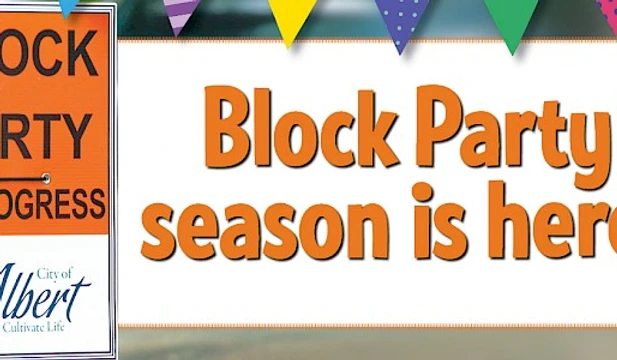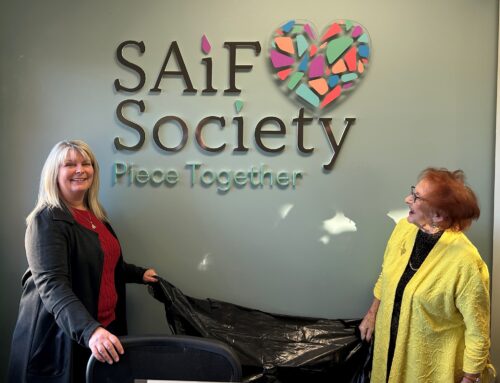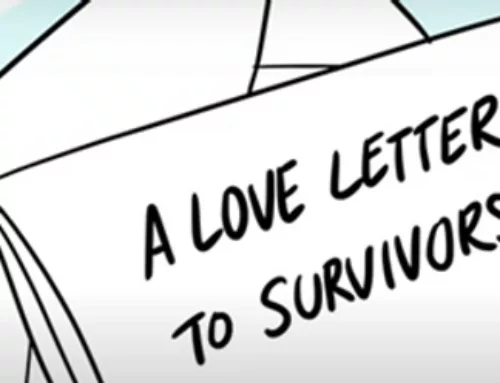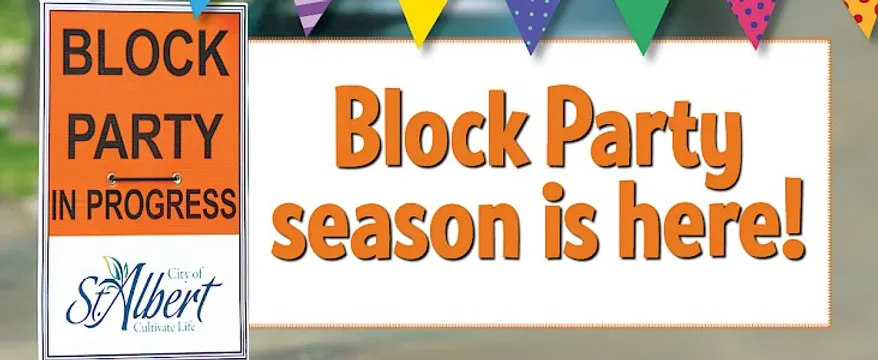
With the summer rolling back around, St Albert is once again firing up those summer block parties! The sun is beginning to shine and we get to have more gatherings and what better way to do it than by making some new connections by quite literally “getting to know your neighbour.”
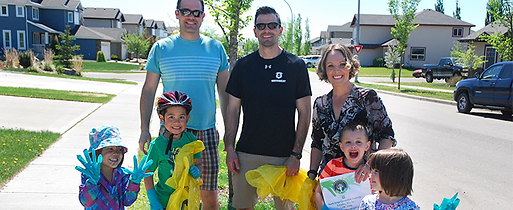
But what do block parties look like since the pandemic?
The City of St Albert has long been a champion of block parties to connect neighbours & neighbourhoods. As part of their efforts, they have a host of resources available for those wanting to organize their own! There’s lots of reasons to encourage & support these types of gatherings and the summer is a perfect time. For instance, studies have shown that neighbours who know each other & are engaged in their communities help make active friendly neighbourhoods that are safer*. But more importantly, getting to know your neighbours has a lot of side benefits around community support and resilience.
Since the pandemic, some people may feel more reserved than they normally would be and many people may have different risk tolerances. Some may prefer to wear a mask, maintain social distancing recommendations, and/or be a little more wary of who they’re engaging with. Some may be re-adjusting to socializing again and figuring out what they’re comfortable with. Some people may be okay returning to exactly what they would have done before the pandemic. So how to be considerate & supportive all around?
First off, empathy goes a long way. Recognizing what others are doing and being respectful of their approach to socializing is important. Don’t push other people’s boundaries. If you’re not comfortable with what someone else is doing, it’s okay to move away or not socialize with them. It’s okay to explain if you have the energy for it but don’t feel you have to. Making a polite excuse is okay, too. Be considerate as you would at any social gathering (we hope!)
How can we stay conscious of those who may need mental health support?
If you’re checking in or prepared to check in, what are the the tell-tale signs of someone experiencing heightened anxiety, depression, PTSD, etc? Okay, that’s a really big ask, but you can be aware of a few obvious signs to be on the look out for:
- Reduced ability to concentrate on conversations
- Emotions of feeling sad or down
- Being withdrawn from the activities they previously enjoyed
- Excessive worrying over small things
- Noticing body language & affect & how it’s changed from what they were like before
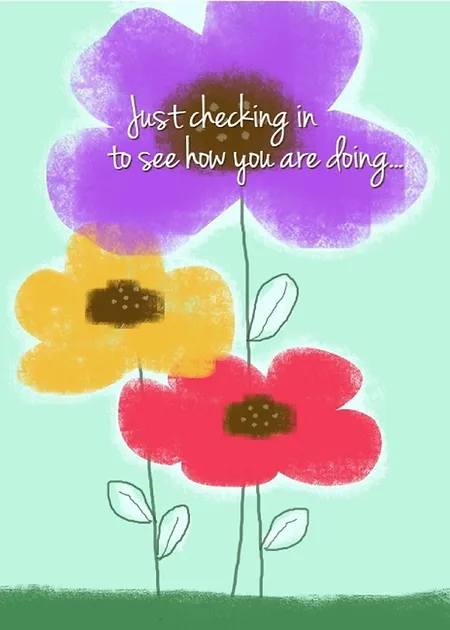
People can tell you lot without saying much. If you knew your neighbours well before the pandemic & it’s just been a couple of years, are you noticing changes that concern you? Do they seem despondent or withdrawn when they weren’t before? Are their arms crossed & not making eye contact when they used to be more open? Checking in is particularly critical – something as simple as ‘Are you doing okay?’ can be an invitation for someone to disclose or share. No need to be pushy if they’re not forthcoming. Just listen. If there is a disclosure, we have some resources down below to share. If there isn’t, you’ve checked in. Sometimes, that single act can help someone realize they’re not alone even if they’re not ready to share.
What if they do seem like they need some access to mental health resources & they’re inviting that conversation?
- you could ask what’s their support like? do they have people to talk to?
- if not, you could suggest they call the Distress Line 780-482-4357 (HELP) or 211
- if it’s a minor (under 18), you could suggest Kids Help Phone text 686868
- be clear about your boundaries – it’s okay to say you’re not a mental health therapist but you care & you want them to get the appropriate service
What if someone tells us they’re being abused or we suspect it?
You may feel unsure of what to look for when you suspect someone is experiencing abuse. It’s important to pay attention to the feelings that give you signals regarding your neighbour or friend that could be experiencing violence or bullying. Family violence can take so many forms and it’s not just physical.
These are some signs that could indicate someone’s being abused:
- Unexplained bruises, marks, scars, or sprains
- A person has become anxious or depressed (when they weren’t before)
- A person’s self-confidence/self esteem is very low (when it wasn’t before)
- A person seems afraid or fearful of their partner
- Significant mood changes – quick to anger or hostility or hyperactivity
- A person withdraws from friends/family or activities they used to enjoy
It can be hard to understand why a person would stay in an abusive situation when its something that’s hurting them. Why don’t they just leave? But family violence is often a complex & difficult issue. Leaving is not always easy, straightforward or safe. The highest incidences of homicide for women in abusive relationships is when they leave or have already left.
The best thing you can do if you notice signs is to check in and stay as non judgemental as you can. If they’re not open or they get defensive or, very likely, they deny anything is wrong, accept their answer. We’re Canadians so you can simply apologize 🙂 – ‘Oh, I’m so sorry. I’ve just been checking in with people I haven’t seen in ages since Covid’ and leave it at that. You’ve made it known you would be open to a disclosure.
Now it’s up to them to reach out if they ever feel the need or feel ready to. Or maybe there’s no abuse and it’s something else. The important thing is, you’ve checked in; you weren’t judgemental; you’ve identified yourself as a safe person for them in the future.
What if you checked in about possible abuse & they’re inviting that conversation?
- you could ask what’s their support like? do they have people to talk to?
- are they safe? do they need to call 911? do they need a safety plan?
- if they’re open to resources or have no one to talk to, you could suggest the Alberta Family Violence Hotline (24/7) at 310-1818 or 211
- if it’s a minor (under 18), you could suggest Kids Help Phone text 686868
- if they don’t need an immediate resource, suggest they call SAiF for an appt. Please note, we’re not a 24/7 service but we’re happy to book appts for them (or if you, as a friend, want some coaching on how to handle this type of situation, we can walk you through that as well). We can also safety plan – 780.460.2195 x301.
- It’s okay to set boundaries about how much you can hear, too. If what they’re sharing becomes overwhelming for you, simply saying, ‘I want to help but this is hurtful for me to hear. It sounds like you have so much to say – can I direct you people who can help you better than I can?’ is compassionate but affirming of your boundaries, too.
The more attention we pay to those around us, the more we can be a conduit to appropriate mental health services or safety for those dealing with abuse.
What the heck? I just want to have a good time!
Ha ha. We totally get that! Not every check in is going to be heavy & deep. And no one says you have to check in if you don’t want to. It’s a neighbourly thing to do…if you have the capacity to do it. Sometimes, we’re just not in the right frame of mind. Sometimes, it’s all we could do to get out of bed this morning ourselves. Knowing your boundaries and being self aware of what you can offer is totally healthy, too 🙂
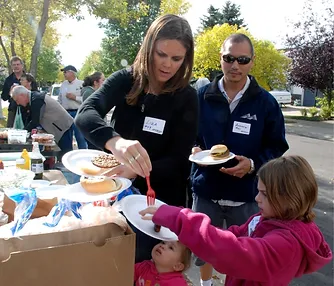
Whenever we have a chance to socialize and connect, especially when it’s been awhile, being mindful of opportunities to check in is not amiss. It’s never a ‘have to’. It’s never a ‘you are responsible or obligated to do this’. Please don’t think that. It’s just very often that others are the conduit to help someone out of an abusive situation or a mental health struggle. A little bit of kindness really can be a bit of light for someone who’s been in a dark place for awhile.
And aren’t block parties just an opportunity to show a little kindness to your neighbours? Have fun this summer & enjoy those wonderful block parties, St Albert!
* https://www.activelivingresearch.org/creating-safe-neighborhoods-active-living-case-study-policy-change
